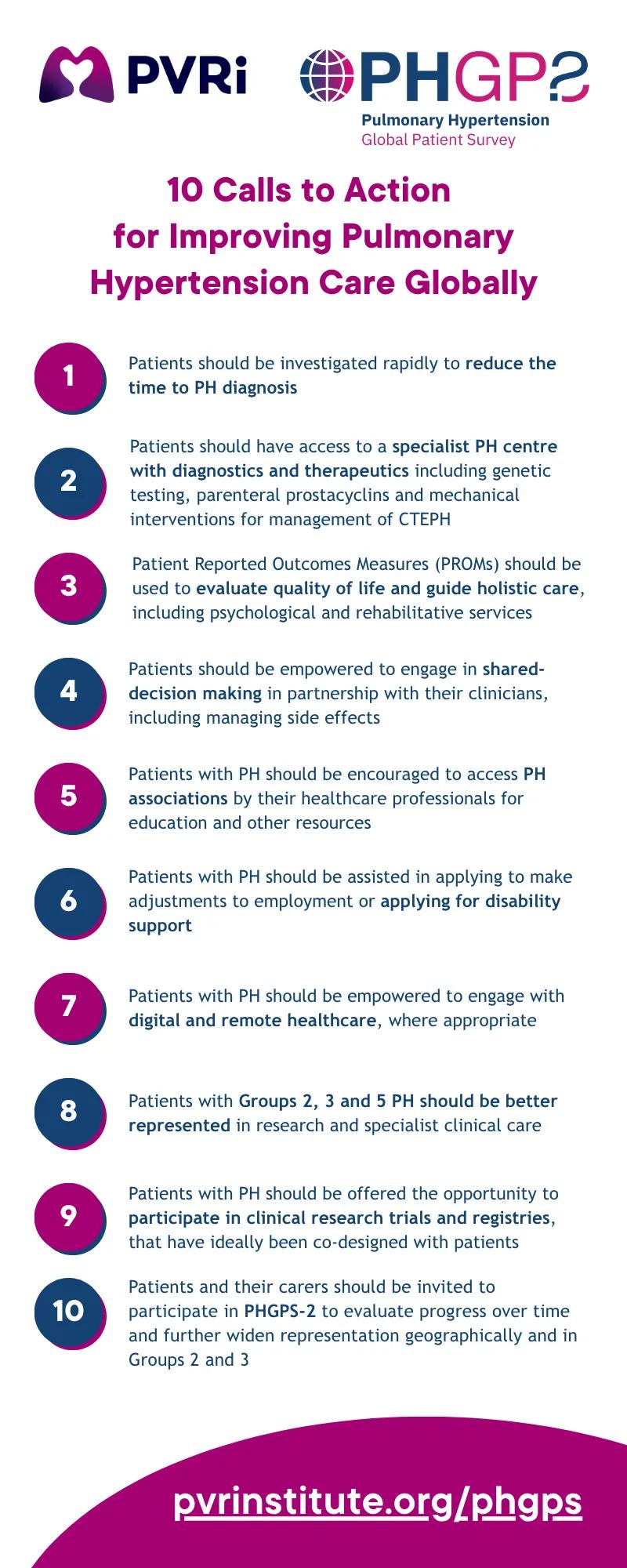Breadcrumb
- Home
- Learning and Research
- Pulmonary Hypertension Global Patient Survey (PHGP...
Pulmonary Hypertension Global Patient Survey (PHGPS)
Thank you to the pulmonary hypertension (PH) community for their participation and contributions to the PHGPS. Phase 1 received a tremendous response, with almost 4,000 patients and carers across 90 countries!
What is the PHGPS?
PH is caused by a range of conditions affecting people of all ages in diverse ways, with differing treatment options and prognoses. Patients’ experience of living with PH is likely to vary considerably within and between countries, but the extent of this variation is unknown. To address this gap and truly understand what it's like to live with PH globally, the Pulmonary Hypertension Global Patient Survey (PHGPS) was launched in October 2023.
This pioneering survey captures real-world patient perspectives and experiences, providing vital insights to advance healthcare improvements worldwide. It addresses key areas like diagnosis, treatment, quality of life, research, and digital health for all PH groups (1-5). The questions have been collaboratively drafted by a multi-disciplinary group including patients, healthcare professionals, researchers, and advocates and is structured to collect input from adult patients, their carers/relatives, and parents of paediatric patients.
Findings
The first findings were published in the ERJ Open Research journal article 'The PHGPS: understanding the experiences and perspectives of patients' in July 2025. The paper highlighted that 3,770 responders from 90 countries across six continents and in 22 languages made the final 3,329 adult (mean age 52.2 years, 81.7% female) and 135 paediatric datasets. Most pulmonary arterial hypertension (PAH) patients reported diagnosis within 12 months of symptom onset. Geographical variability was seen in PH management and research participation, favouring the Global North. 33.9% (401/1183) of patients, where eligible, reported genetic testing. 58% were experienced in self-monitoring their health. 20.6% of PH patients have completed Patient-Reported Outcome Measures (PROMs), with 7% feeling they changed management. 19.1% of adult patients have participated in research, however 72.2% who have not participated would be willing if invited.
10 Calls to Action
The findings also led to 10 key global priorities for improving adult patients living with PH care. These 10 calls to action, published in a Letter to the Editor in Pulmonary Circulation in July 2025 aim to enhance equitable access to care and research opportunities, particularly across areas of geographical disparities.
- Patients should be investigated rapidly to reduce the time to PH diagnosis
- Patients should have access to a specialist PH centre with diagnostics and therapeutics including genetic testing, parenteral prostacyclins and mechanical interventions for management of CTEPH
- Patient Reported Outcomes Measures (PROMs) should be used to evaluate quality of life and guide holistic care, including psychological and rehabilitative services
- Patients should be empowered to engage in shared-decision making in partnership with their clinicians, including managing side effects
- Patients with PH should be encouraged to access PH associations by their healthcare professionals for education and other resources
- Patients with PH should be assisted in applying to make adjustments to employment or applying for disability support
- Patients with PH should be empowered to engage with digital and remote healthcare, where appropriate
- Patients with Groups 2, 3 and 5 PH should be better represented in research and specialist clinical care
- Patients with PH should be offered the opportunity to participate in clinical research trials and registries, that have ideally been co-designed with patients
- Patients and their carers should be invited to participate in PHGPS-2 to evaluate progress over time and further widen representation geographically and in Groups 2 and 3
Posters & manuscripts
- Pulmonary Circulation Editorial: PHGPS: A Call to Action 2025
- ERJ Open Research article: The PHGPS: Understanding the experiences and perspectives of patients
- Poster: PVRI 2025: Results from the PHGPS
- Poster: ERS 2024: PHGPS overview and results
Interested in accessing global data on PH patient experience?
Almost 4,000 patients and carers across 90 countries took part in Phase 1 of the Pulmonary Hypertension Global Patient Survey. Their responses provide one of the most comprehensive pictures we’ve ever had of what it’s like to live with PH around the world.
The survey covers every stage of the patient journey — from diagnostic tests and timelines to treatments, genetic testing, financial pressures, hospital visits, research participation, quality of life, telemedicine, PROMs, and self-monitoring through digital tools. These insights have the potential to shape better patient care, guide future research, and help us address unmet needs globally.
If you’re interested in exploring the dataset in more depth, you can now download our PHGPS Data & Insights Guide, which outlines the full survey structure and the types of analysis the data can support.
What have patients told us?
"I was diagnosed 15 years ago. I completed the survey as it will help to improve the care that PH patients experience from across the world."
Tess Patient, United Kingdom
"I am so delighted that we now have a global survey which gives us meaningful and detailed insights into how PH is affecting patients and their families around the globe – a good look at the patients' perspective which will help improve understandings of how to care for patients across the world. Thank you so much to all the patients and their families for taking the time and care to participate."
Gabi Lowe Founder and Director of The Jenna Lowe Trust, South Africa
"Conducting a worldwide survey on the effects of pulmonary hypertension on patients' daily lives and mental well-being is a crucial step towards shedding light on their struggles, needs and aspirations, fostering understanding and empathy and driving initiatives for better care and support."
Pisana Ferrari Patient advocate, Italy
Thank you
"I want to thank the whole pulmonary hypertension community for contributions to create the survey and for encouraging patients living with pulmonary hypertension to complete it. This survey will give us the most valuable knowledge on how the condition is affecting patients and their families; and will also improve our understanding on the ways we care for the patients across the world. We thank patients for their help to our research."
Dr Joanna Pepke-Zaba, PhD FRCP, Royal Papworth Hospital and University of Cambridge
Frequently asked questions
The survey was designed for patients who live with all types of pulmonary hypertension but could be completed by a family member or caregiver on behalf of the patient. If the patient was below 16 years of age, the survey was completed by a parent or guardian. Where possible, the survey was completed in the respondent's native language. All data is anonymised for academic publication an presentation.
The PHGPS was designed to help improve global understandings of how PH affects the lives of patients and in what ways PH care needs to be improved. It was written by a multidisciplinary panel of PH specialists and patient group advocates from the Pulmonary Hypertension Associations of Europe, United States, United Kingdom and South Africa. It was coordinated by the Pulmonary Vascular Research Institute's (PVRI) Patient Engagement & Empowerment Workstream and endorsed by ERN-Lung.
To make a data request, please see our Data Access Policy.
Thank you to the panel of PH specialists and patient group advocates from Pulmonary Hypertension Associations of Europe, United States, United Kingdom and South Africa who helped write the survey. It was coordinated by PVRI’s Patient Engagement & Empowerment Workstream and endorsed by ERN-Lung.
If you have any questions, please contact us.
Find out more...

Want to find out more about PVRI without becoming a member?
Are you a healthcare professional, patient or carer? Join our community as a Friend of PVRI and receive PVRi Pulse - our monthly newsletter that keeps you up to date with our latest news and developments.
